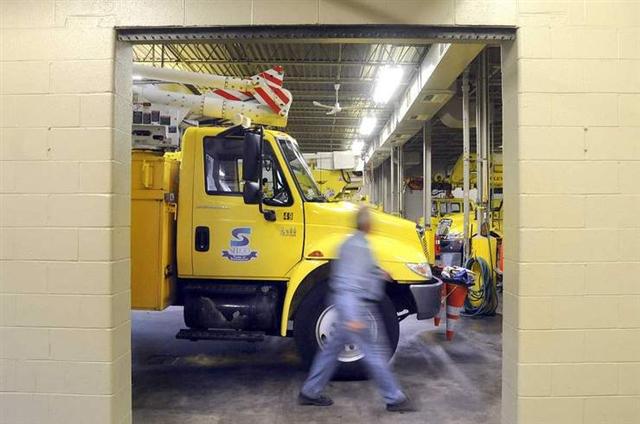
Sunday, October 23, 2011
Municipal power companies know their communities

Lineman John E. Welch of Holden restocks his truck during a day of work at SELCO, Shrewsbury Electric and Cable Operations in Shrewsbury. (T&G Staff/TOM RETTIG)
By Brian Lee TELEGRAM & GAZETTE STAFF
Well after Tropical Storm Irene left Northbridge neighborhoods in the dark for nearly a week in late August, Town Manager Theodore Kozak is still rankled at National Grid.
“They were a little lax in having the people ready for such a storm,” Mr. Kozak said recently. “I don’t think it was that bad of a storm to have people wait so long. They need themselves to be more ready with backup for the next problem storm.”
But as state lawmakers consider legislation that would allow creation of municipal power companies beyond the 41 that exist in Massachusetts, Northbridge officials aren’t considering the potentially costly undertaking of creating one.
“I don’t think you can just do it,” Mr. Kozak said.
Instead, Northbridge’s public works director is focused on working with National Grid on cutting tree limbs and branches that stick out over power lines, and otherwise being more prepared for the next big storm, he said.
Meanwhile, the Massachusetts Municipal Wholesale Electric Co., a nonprofit public corporation that resells power from power plants it owns shares in, does not have a position on the proposed legislation, according to spokesman David Tuohey.
MMWEC’s member companies include municipal utilities in Ashburnham, Boylston, Holden, Paxton, Princeton, Shrewsbury, Sterling, Templeton and West Boylston.
If the legislation is approved and additional municipal utilities are created, MMWEC certainly would be willing, and happy, to provide its services to them, Mr. Tuohey said.
Mr. Tuohey said municipal power companies know their communities, and are proactive about cutting trees and branches near power lines. That was also a common explanation from local municipal power company officials as to why they outperformed investor-owned companies such as National Grid during the tropical storm.
But Mr. Tuohey said creating a power company is “not for everyone,” adding it is a different time from when MMWEC member utilities were formed. The last one formed in the 1920s.
Fitchburg, which was peeved by Unitil’s performance after the 2008 ice storm, is among local communities interested in creating a municipal utility company.
Mr. Tuohey said he has received many inquiries over the years from different towns. He said their interest grows when the investor-owned power companies have service problems associated with storms.
West Boylston Town Administrator Leon A. Gaumond, Jr., whose community has West Boylston Municipal Light Plant, said startup costs are something many towns would want to consider.
“My guess is that some municipalities in this economic climate are probably reluctant to try to take on those types of responsibilities, even if the services are better and they might save money,” Mr. Gaumond said.
A town would need to find a facility, equipment, trained personnel and a means to acquire or lease the numerous utility poles. If the poles are owned by National Grid, the company “doesn’t just turn it over to you,” he said.
“Some communities will have an easier time getting from point A to point B than maybe some other communities,” he said. “That’s why for the most part you haven’t seen communities go down this road. I mean most of the MLPs that are in the state are decades and decades and decades old.”
Michael Hale, general manager of Shrewsbury Electric and Cable Operations, said a hurdle with the legislation is infrastructure challenges created by investor-owned companies serving multiple contiguous towns.
“For one town to go municipal that is in between two other towns they serve, from an infrastructure standpoint, that creates great challenges because their territory isn’t divided by political boundaries,” Mr. Hale said. “There might be a transformer in Westboro that also services part of Hopkinton and Northboro. And so, if Westboro drops out, then how are those other communities fed? It’s not insurmountable but it creates a fairly significant challenge.”
As a counterpoint, investor-owned utilities have argued a drawback to the legislation is that municipal power companies don’t pay taxes to the town.
For instance, National Grid paid $101.1 million in property taxes throughout the state, including $6.2 million in Worcester for the fiscal year ended in June, a spokesman said in an email.
But Mr. Tuohey, the MMWEC spokesman, said most municipal power companies make payment in lieu of taxes to towns, sometimes in excess of what the town would collect if it was served by an investor-owned utility.
Shrewsbury’s electricity system made a payment in excess of $150,000 to the town last year, according to the town’s annual report. In addition, Mr. Hale said SECO also provided a number of in-kind services.
Paxton Municipal Light Department did not make a payment in lieu of taxes.
But Paxton didn’t have any outages from the August tropical storm, despite several trees and limbs coming down that day. None took out power lines in Paxton because linesmen went out earlier to clear limbs from specific areas, said Gregory D. DeStasi, manager of PML.
Paxton Town Administrator Carol Riches said the town has never asked the municipal light department to make a payment in lieu of taxes.
“I think it all works out even in the end,” she said.
Contact Brian Lee by email at blee@telegram.com
